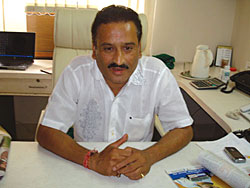 KHAGENDRA KATTEL |
First, there were the relentless hartals that had brought life to a standstill along the eastern Tarai. Then the Kosi breached its embankment, not just making 60,000 people homeless but also cutting off the East-West Highway linking the east with the rest of Nepal.
Manufacturers were affected, the tea industry suffered huge losses and hundreds of thousands of people had their movement restricted. The alternative was to travel two days via India, or take the precarious ferry across the Kosi at Chhatara.
"Our region was devastated, business and industry was severely affected, but still the business community got together to help the victims," says Mahesh Jaju, president of the 58-year-old Morang Merchants Association (MMA).
MMA's members represent 850 companies, 1150 trading houses, 12 commodities association members and it has branches in Urlabari, Rangeli, Letang, Madhumalla, Pathari, Belwari and Indrapur. Jaju is also the Managing Director of Asian Thai Foods, which produces noodles and snacks, and employs about 550 people.
MMA has been visiting the flood-affected areas to organise relief and also to keep an eye on the rehabilitation work on the Kosi embankment. The business community has also taken the lead to bring various stakeholders in the Kosi reconstruction together to speed up the work before the next monsoon.
MMA estimates that the business community in Biratnagar lost an estimated Rs 3.5 billion in the floods. Factories selling goods in the rest of Nepal had to close shop. However, thanks to an Indo-Nepal agreement brokered by MMA, transit facility was provided via India that gave some relief to medium and large industries.
The MMA has demanded a relief package for flood-affected industries including subsidy for electricity, VAT rebate, reduction in bank interest rates, loan rescheduling. But businessmen say there has been no response from the state.
Jaju says that even though the east may survive flood disaster, the law and order problems continue to be precarious with abduction, extortion and threats against businesses by various militant and underground criminal groups.
"Crime and law and order is the biggest problem we have," Jaju says, "the administration is not able to restore security and the political parties seem to lack the will."
The floods and law order crises have been compounded by the 18-hour load-shedding for the first half of this year. "It crippled whatever was left of the industries," says Jaju, "the cost of production shot up and affected turnover, especially of the smaller industries." The politicisation of the unions was another issue that exacerbated existing crises.
Jaju is convinced that political stability in Kathmandu is the key factor. After that, a visionary plan to exploit natural resources to spur infrastructure and economic growth holds the key to creating jobs so Nepalis don't have to migrate overseas.
"It is now becoming very urgent to find a way out of this crisis," he told Nepali Times, "until we find ways to use
our energy and ideas, we will never develop."
Juju's Rumpum noodle brand has carved out a name for itself in Nepal and northeastern India. "As an industrialist, my aim has always been innovation," says Juju, "despite obstacles and negative factors all around, the trick is to never lose the hope and keep a positive outlook."
Khagendra Kattel


